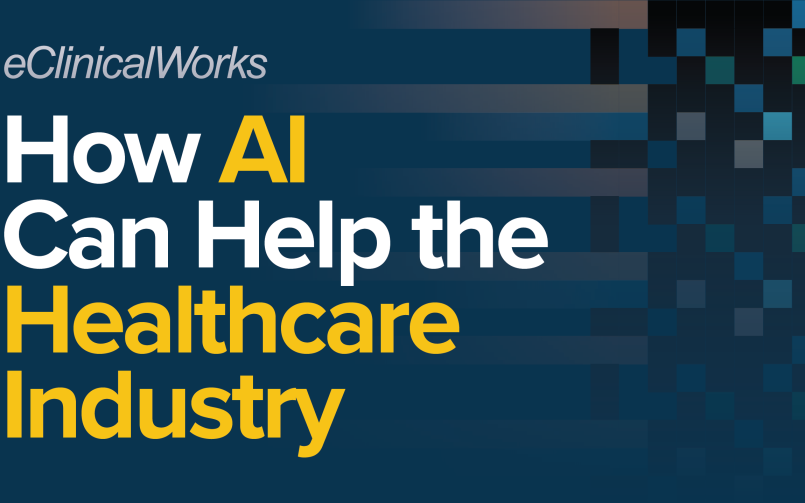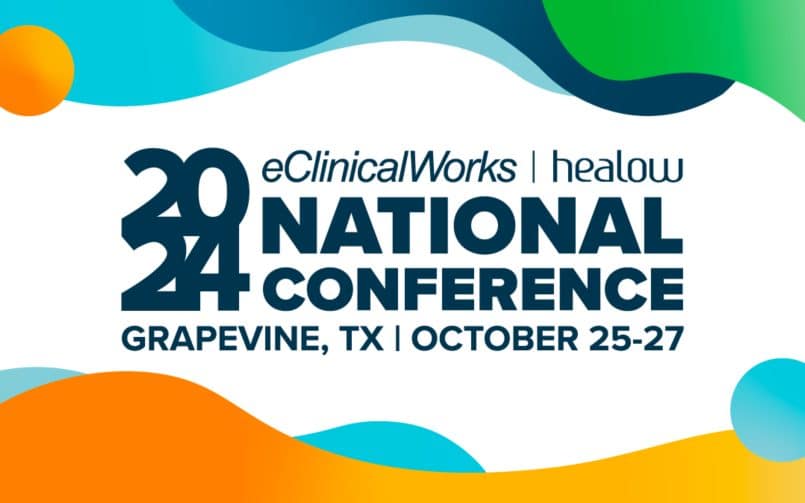eClinicalWorks Blog

- 22 August, 2024
- blog
Steering Your Practice Toward Success
Phoenix Pointe Psychiatry Skyrockets Success with eClinicalWorks RCM Services Setting up your own practice can be a challenging — from getting an office space ready to hiring and training staff, acquiring patients, implementing the latest healthcare technology, navigating administrative duties, and juggling all of it while maintaining the quality of care.
Continue Reading
- 15 August, 2024
- blog
The ABCs of Back to School — for Patients and Practices
They are the three little words that students and teachers nationwide (and some medical practices) dread: Back to school!
Continue Reading
- 8 August, 2024
- blog
Revolutionizing Patient Care with eCW AI and Cloud-Based Solutions
At a recent eClinicalWorks hosted event, Healthcare IT Today interviewed select eClinicalWorks customers who’ve implemented the eClinicalWorks Cloud-based EHR and AI solutions and discussed at length how the products have had a positive impact on their healthcare practices.
Continue Reading
- 1 August, 2024
- blog
eCW Users Excited to Implement AI at Their Practices
The eClinicalWorks® 202 I 4 Health Center Summit was a fusion of anticipation, inspiration, and technological revelation. Attendees expressed their excitement about the prospects of implementing eClinicalWorks (eCW) AI technology at their healthcare practices. Last year, eCW introduced a series of groundbreaking AI functionalities integrated within the multidimensional V12 EHR system to streamline workflows, enhance office efficiency, and improve patient satisfaction. Even more, AI technology is said to relieve physicians from administrative burdens. Some of the attendees shared their experiences of how AI technology has turned up the efficiency in their clinical operations:
Continue Reading
- 30 July, 2024
- blog
How AI Can Help the Healthcare Industry
eCW Poll Identifies Key Challenges and Solutions Whatever their specialty, however large their practice, and regardless of how diverse their patient populations may be, America's healthcare professionals share a common challenge — administrative tasks. Year after year, case studies, surveys, polls, and anecdotal evidence agree that grappling with office administration — everything from check-in and insurance authorizes to care documentation, fax boxes, and gathering patient records — is among the biggest challenges in healthcare. All that administrative work generates an ever-growing flood of data. And while much of it is essential to providing prompt, quality care to patients, it is also very easy to lose one's way amid such work. That can leave doctors and staff feeling disconnected — both from the patients they care for and from their own families and personal lives — as their administrative work consumes their evenings, cutting into the "pajama time" we all need to rest, relax, and recharge. Our May 2024 poll of more than 120 healthcare professionals confirms these findings. Indeed, 41 percent of respondents told us they are spending four or more hours every day on documentation alone. That's like spending half your workday simply recording what you did during the other half. But remember that, in medicine, there are few timeouts. Patients keep coming, data keeps flowing in, and the time for completing documentation and other administrative work often extends beyond the hour when the office closes — and can run well into the evening.
Continue Reading
- 26 July, 2024
- blog
How to Maximize Efficiency of an AI-Powered Medical Scribe
The healthcare industry has always been a frontrunner in embracing innovations, and artificial intelligence (AI) is no exception. A striking example is the growing use of AI medical scribes like Sunoh.ai, designed to automate clinical documentation and reduce the burden of administrative tasks. According to research, AI scribe saves doctors an hour at the keyboard every day, thereby allowing healthcare providers more time to connect with their patients. Remember, technology is a tool, and effective communication is the secret sauce that will help healthcare professionals get the best out of AI medical scribes. This will not only enhance productivity but also enhance patient satisfaction and overall healthcare delivery. Here are some insightful communication tips to optimize your use of AI medical scribes:
Continue Reading
- 19 July, 2024
- blog
Transforming Rheumatology Workflows with eClinicalWorks
Transforming Medical Documentation with AI: Success Stories from Sunoh.ai In the rapidly evolving healthcare field, accurate and efficient documentation is paramount. Enter Sunoh.ai, a revolutionary Medical AI Scribe designed to streamline clinical documentation. This blog highlights the success stories of those who have benefited from this cutting-edge technology. Saurabh Singh and Rakhee Langer, vice presidents of Sunoh.ai, discuss the advancements of the medical AI scribe and offer intriguing insights into how ambient listening is transforming the healthcare industry. They also share compelling anecdotes from users, such as a provider who can now get home early to spend time with family, showcasing the profound impact of this technology. Watch the Interview with John Lynn from Healthcare IT Today.
Continue Reading
- 11 July, 2024
- blog
The 2024 eClinicalWorks® and healow® National Conference: Grapevine Awaits You!
eClinicalWorks and healow National Conferences are renowned for providing a platform to exchange innovative ideas, discuss trends, and learn about the latest advances in digital healthcare solutions. The history of these national conferences goes back 17 years, with each event introducing key enhancements and innovative features and offering attendees a wealth of knowledge and networking opportunities. Each year, the conference continues to evolve and serve as a catalyst for positive change within the healthcare IT industry. Last year, the 16th annual eClinicalWorks® and healow® National Conference in Nashville was a huge success with the introduction of the eClinicalWorks AI Assistant, the healow no-show predictive tool, and updates to our products and services across the board. Attendees were surprised to witness how harnessing the power of AI can transform patient visits and clinical workflows. This year's conference, held on October 25-27 at the Gaylord Texan Resort & Convention Center in Texas, will showcase innovative healthcare IT solutions from eClinicalWorks and healow and spotlight how artificial intelligence is changing the game in healthcare. Witness how AI-driven tools can help your practice reduce no-shows, boost your bottom line, improve patient satisfaction, and support better health outcomes. Immerse yourself in the keynote address and product showcase, and take advantage of unparalleled networking opportunities with 100+ breakout sessions.
Continue Reading
- 27 June, 2024
- blog
Optimizing RCM for Growth Today and Tomorrow
NYC dermatology practice finds everything it needs with eCW Usually, when something seems too good to be true, it turns out not to be true. But for Gil Messer, chief operating officer of The Dermatology Specialists (TDS), the largest such specialty practice in New York City, what seemed too good to be true really was true — and then some. TDS first engaged eClinicalWorks for Revenue Cycle Management (RCM) services in 2007, when they launched their practice with a single office. Seventeen years and 40 additional sites later, Messer said the need for optimizing their RCM services was clear. “About April of last year,” Messer said, “we had hit a breaking point, where we realized it wasn't sustainable and the root cause was ¬— it was designed and built for that single provider office back in 2007.” With 41 offices and 15 different payer websites to navigate, Messer said that he and his colleagues were having to engage in manual intervention on many claims and were running into a large number of submission errors, leading to administrative headaches, delays in getting paid, and a rising number of days for accounts receivable (A/R).
Continue Reading
- 6 June, 2024
- blog
Dental Practices Keep Brushing Up on Technology
How Sunoh.ai medical scribe can advance care Ask someone to list major medical advances, and they are likely to list such things as the eradication of polio, the development of new drugs, the mapping of the human genome, or breakthroughs that are helping improve cancer survival rates. It’s easy to forget about dental care. But good oral health, so often overlooked, remains a vital part of leading a full and healthy life. The list of advances in dentistry is impressive, from the use of drugs to numb pain to more precise and less invasive ways to detect and treat dental decay. Digital radiography has reduced patients’ exposure to X-rays. Silver amalgams have largely been replaced with safer, natural-looking materials. But there’s another way that today’s dental providers can improve their practices and better serve patients—by adopting an AI medical scribe known as Sunoh.ai. eClinicalWorks recently announced that it is integrating Sunoh.ai into dental clinics across the country.
Continue Reading
- 4 June, 2024
- blog
Physicians Have Limits — Healthcare IT Can Help
Physicians Have Limits — Healthcare IT Can Help Every medical practice is more or less different from every other, whether by virtue of size, location, specialty, or emphasis. But every medical practice, from the smallest rural health center to the largest urban hospital system, shares one economic reality — resources are always limited. Many providers work long hours to serve their patients, often completing their daily documentation in the evening from home. But clocks, calendars, and human endurance sets limits. There are only 24 hours in a day and seven days in a week. Add in a shortage of physicians and ever-increasing demands by patients, and it is not surprising that surveys consistently show that about two-thirds of U.S. providers report at least one symptom of burnout.
Continue Reading
- 24 May, 2024
- blog
Feeling burned out? There’s a tech prescription for that!
While every new physician enjoys the opportunities and challenges of practicing medicine, many doctors soon find themselves among the nearly two-thirds of their profession who regularly report experiencing at least one symptom of burnout. According to an American Medical Association report, that included 62.8 percent of all doctors in the U.S. as of September 2021 — a steady increase over the previous decade. Overworked doctors and their staffs dream about hearing words like “Why don’t you take half a day!” The problem? That usually means taking half a day to complete their documentation. If you’re thinking that this technologically advanced world has to offer a better way to get all that work done, you’re right — they’re called AI medical scribes. Dawn of the AI-powered scribes Humans have been doing medical transcription work for many years. But the remarkable advances in artificial intelligence mean that a new generation of solutions with ambient listening capabilities are now available to complete AI documentation and AI transcription tasks. And most of the time, in most circumstances, these AI-powered scribes are faster, cheaper, and more accurate than even the best humans. They can distinguish accents and multiple speakers and exhibit a high degree of accuracy. AI in primary care practices is particularly important given that these front-line medical practices are in constant high demand and face a long-term shortage of physicians. According to Dr. Joseph Osuagwu, documentation is a widespread issue among providers at his practice, Goodtime Family Care in Baltimore, Maryland. Providers at Goodtime experienced complications with traditional note taking techniques, which were labor-intensive, susceptible to inaccuracies from human mistakes, and frequently interrupted the patient interaction process. On hectic days, capturing the complete HPI and other crucial details was often missed due to a shortage of time.
Continue Reading